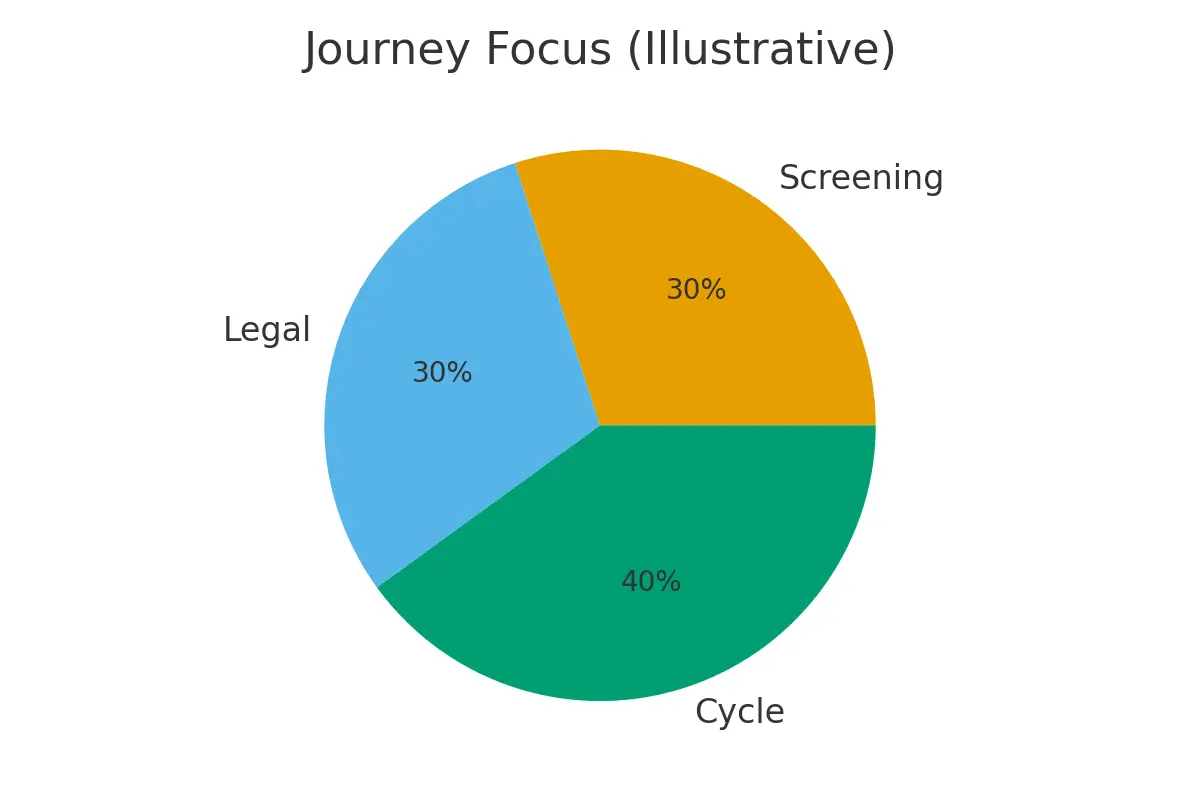
Disclosure to children means explaining that their conception involved donor eggs, sperm, or embryos. While some families delay or avoid disclosure, growing research and lived experiences suggest that openness—at the right time and in age-appropriate language—fosters trust and healthy identity development. The “when” and “how” matter as much as the “what.”
Who It Helps
This guidance helps parents who:
- Are considering donor conception and want to plan disclosure early.
- Already have children conceived with donor gametes and wonder when to start the conversation.
- Worry about emotional impact, cultural differences, or social stigma.
Children benefit most when disclosure is thoughtful, consistent, and supportive. Parents benefit by reducing anxiety and avoiding reactive conversations later (for example, if a child discovers the truth through genetic testing or outside sources).
Step-by-Step:
A practical disclosure roadmap:
- Infancy to toddlerhood (0–3 years): Begin with simple storytelling. Babies may not understand, but parents build confidence in using donor-conception language.
- Early childhood (3–7 years): Use picture books and simple phrases: “A kind person helped us have you.”
- Middle childhood (8–12 years): Introduce more details. Children can grasp concepts like eggs, sperm, and embryos.
- Adolescence (13+ years): Maintain open dialogue. Teens may ask deeper biological or identity-based questions.
- Adulthood: Support ongoing conversations, particularly if children express interest in donor identity.
Checkpoints, not deadlines, matter most—timing should align with the child’s developmental stage rather than parental anxiety.
Pros & Cons
Pros of early disclosure:
- Builds family trust.
- Normalizes the child’s origin story.
- Reduces shock later in life.
- Prepares children to handle external questions.
Cons or trade-offs:
- Parents may feel unprepared for tough questions.
- Timing can be complicated in extended families or cultural contexts.
- Risk of oversharing before a child is ready.
Balanced disclosure requires preparation, not perfection.
Costs & Logistics
Disclosure does not require large financial outlays, but logistics matter:
- Books & resources: ~$20–$50 for children’s books or guides.
- Counseling: $100–$200/session for family therapy or disclosure coaching.
- Time investment: Regular, small conversations over years rather than a single “big reveal.”
Budget certainty comes from planning these as part of the family-building journey, not as unexpected later expenses.
What Improves Outcomes
- Early planning: Thinking about disclosure before pregnancy reduces parental stress.
- Consistent language: Use simple, repeatable phrases across family members.
- Professional support: Child psychologists, genetic counselors, or donor conception networks can help.
- Openness with boundaries: Honesty without overwhelming detail.
What rarely changes outcomes: waiting for a “perfect” age. Children adapt better when disclosure is gradual, not delayed.
Case Study
A couple used donor eggs after multiple IVF failures. From toddlerhood, they read a bedtime story about “a special helper who gave us an egg.” By age 10, their daughter understood that her genetic background differed but felt secure because the story had always been part of her identity. She expressed curiosity, not betrayal—showing the power of age-appropriate, consistent disclosure.
Mistakes to Avoid
- The “big reveal”: Waiting until adolescence or adulthood often causes shock or mistrust.
- Inconsistent narratives: Different explanations from parents confuse children.
- Overloading: Sharing too many medical or legal details too soon.
- Avoidance: Hoping children will “never ask” often backfires in the era of direct-to-consumer DNA testing.
FAQs
Q. When is the best time to tell children about donor conception?
Ans. Earlier is better. Many experts recommend beginning in toddler years with age-appropriate language, then adding details as children grow.
Q. What words should I use?
Ans. Keep it simple: “A kind person helped us by giving an egg/sperm/embryo, and that’s how we could have you.” Over time, layer in more specifics.
Q. What if my partner and I disagree on disclosure?
Ans. Seek counseling. Unified messaging is critical for family trust. A professional can help align values and reduce conflict.
Q. How do I handle questions about the donor’s identity?
Ans. Answer honestly within your boundaries. If donor-identity release is possible, explain timing. If anonymous, emphasize love and family bonds while acknowledging the unknown.
Q. What happens if I wait until my child is older?
Ans. Late disclosure increases the risk of mistrust, especially if discovered accidentally through relatives, medical history, or DNA tests. It’s usually harder to repair trust than to build it early.
Schedule a free 15-minute nurse consult, upload your labs, and receive a personalized cost breakdown. Planning for disclosure alongside medical decisions ensures stronger family outcomes and less stress down the road.
Next Steps
- Free 15‑min nurse consult
- Upload labs
- Cost breakdown for your case.
Related Links

Dr. Kulsoom Baloch
Dr. Kulsoom Baloch is a dedicated donor coordinator at Egg Donors, leveraging her extensive background in medicine and public health. She holds an MBBS from Ziauddin University, Pakistan, and an MPH from Hofstra University, New York. With three years of clinical experience at prominent hospitals in Karachi, Pakistan, Dr. Baloch has honed her skills in patient care and medical research.





